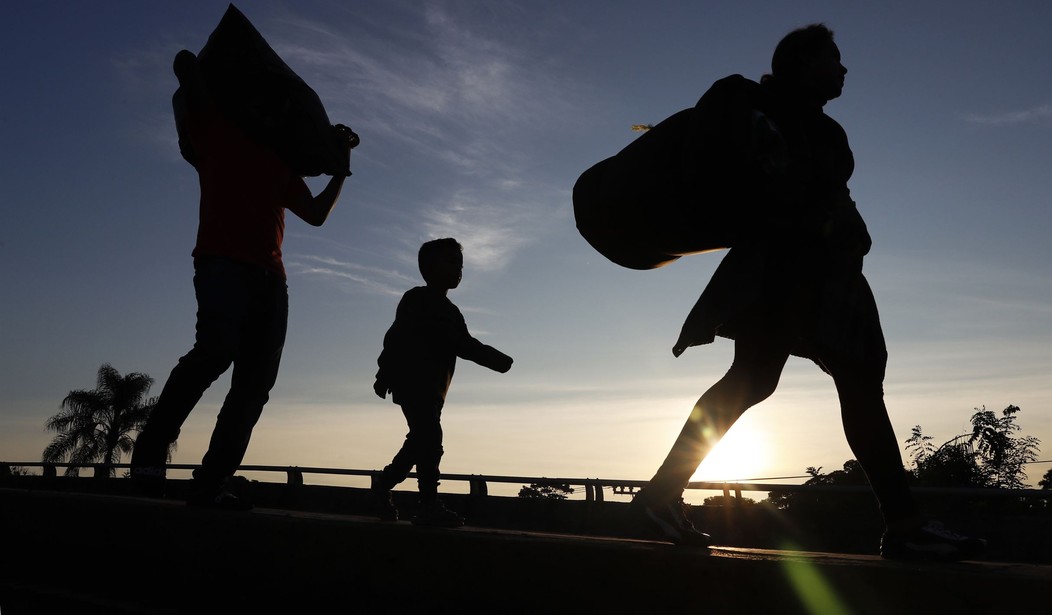I don’t expect you to have a favorable opinion of what is happening at the border. A crisis is unfolding, and I don’t ask you to enjoy any form of it. I don’t ask you to support the policies as they are written. However, I urge you to acknowledge the truth being presented. The truth is that the media is disseminating misinformation and politicians are playing games. Sound familiar?
Immigration Parole
Late on Thursday, hours before Title 42 was set to expire, a federal judge in Florida issued a ruling blocking certain aspects of the Immigration Parole program. An injunction hearing is scheduled in two weeks. This lawsuit was filed by Florida Governor Ron DeSantis and Florida Attorney General Ashley Moody on Thursday.
Border Patrol issued a memo on Wednesday with guidance for “parole with conditions” as a way to address potential overcrowding in detention facilities. Immigration parole is typically granted on a case-by-case basis for reasons of significant public interest or humanitarian concerns. The program requires financial sponsors, background checks, the ability to pay for travel, and health requirements. Normally, the process takes 60-120 days, but it can be expedited in certain circumstances.
While using the parole program for overcrowding purposes is not consistent with its usual operation, there is no specific definition of “significant public benefit” in the statutes or regulations.
Furthermore, it’s important to note that the parole program was never intended to serve as an asylum program. If individuals are granted immigration parole, they still need to apply for asylum separately. This nuance explains why you see sensationalized headlines claiming that people are not given asylum or court dates. That’s because it’s not an asylum application process.
I will leave much of the speculation and political posturing to the courts and campaign rivalries regarding how the program implementation aligns with the existing criteria. The core of the argument will likely revolve around semantics and a phrase that lacks a clear definition in the statutes. Per US Citizenship and Immigration Services:
Immigration parole is granted on a case-by-case basis for reasons of significant public benefit or humanitarian concerns. It can include law enforcement and national security reasons, as well as foreign or domestic policy considerations. USCIS officers assess all the circumstances presented in each case.
While the beneficiaries may personally benefit from parole authorization, the statutory standard focuses on the public benefit derived from extending parole.
In my understanding, Border Patrol had the discretion to use the parole program as long as the program requirements were met.
President Biden has established nationality-specific parole subprograms for Haitians, Cubans, and Nicaraguans, which seems to contradict the “case-by-case” standard, but okay. He has been targeting specific nationalities with unequal treatment since taking office (but we can delve into that further later). Immigration Parole was used in conjunction with Title 42 to ensure that the most vulnerable individuals couldn’t access asylum or qualify for admission under parole.
In my view, the program’s requirements and criteria do not adequately address the needs of refugees or asylum seekers. It doesn’t serve as either.
Regarding individuals from crisis-stricken societies who are migrating through the dangerous Darien Gap, it’s important to ask why they are forced to take that route instead of a more conventional path. The answer lies with President Biden.
Biden’s visa policy demands with Mexico and Peru have left the Darien Gap as the only viable route for many migrants. So, while you may hear that the border is “open,” we need to consider the concept that Biden has borders beyond our own border. If he didn’t, there would be no need for migrants to risk their lives in the Darien Gap.
While it is reasonable for certain forms of immigration to require financial stability, it’s important to acknowledge that those who could afford visas and plane tickets have likely already left their home countries, such as Venezuela. The individuals enduring the perilous journey through the Darien Gap, a treacherous and violent jungle, are not the ones who can easily access the parole program. Instead, the program targets Cubans, Haitians, and Nicaraguans who have been specifically affected by Title 42 and who are among the groups with the largest increases in migration. These individuals come from societies facing crises and often travel through the dangerous Darien Gap.
Discard the notion that Biden is solely a helpful advocate for migrants in this scenario and instead examine his broader range of policies.
Title 42
Title 42, in reality, is ending because it was implemented as an executive order contingent on the national emergency caused by the COVID-19 pandemic in 2020. The declaration of a national public health emergency is scheduled to end on Friday. Title 42 allowed for the expulsion of migrants without processing or the ability to seek asylum for a period of 38 months. While the termination of Title 42 is expected to lead to increased migration, it signifies a return to the previous policy outlined in Title 8.
It is true that Biden utilized Title 42 more frequently than former President Trump. Millions of migrants have been expelled under this order, particularly from specific nations, which is an important detail to note. Although the end of Title 42 signifies a return to the established policy, the nationalities of the migrants do not reflect the pre-pandemic demographics.
In the fiscal year 2020, the top four nations of origin encountered at the border were Mexico, Guatemala, Honduras, and El Salvador. However, during the first six months of fiscal year 2023, the ranking has shifted, with Cuba, Nicaragua, and Colombia surpassing Guatemala as the second, third, and fourth highest nationalities encountered. This demonstrates that there are specific humanitarian and/or political crises in these countries. All of these, except for Cuba, have current Temporary Protected Status (TPS) designations recognized by the US government.
Title 42 was enforced in an origin-based manner, based on an agreement with Mexico to accept expelled migrants according to their nationalities. In essence, if individuals were from nations deemed too expensive to expel by plane or if their nations hadn’t agreed to repatriation flights, and Mexico refused to accept them: Title 42 did not apply.
Its prolonged usage was primarily driven by convenience rather than public health, although this uncomfortable fact might be something you already intuitively knew. It’s not about COVID, now is it?
In March 2020, the Border Patrol started sending most Mexican, Guatemalan, Honduran, and Salvadoran families and single adults encountered at the southern border back to Mexico under an agreement reached with the Mexican government. This group of nationalities subject to expulsion to Mexico remained unchanged until May 2022, when the Biden administration reached an agreement with Mexico to include “thousands” of Cubans and Nicaraguans as well.
Despite this agreement, numerous instances have been documented of individuals, including Haitian asylum seekers, being expelled to Mexico even though they did not fit within the designated category.
It’s important to note that “building a wall” will not address the situation you observe at the ports of entry with asylum applicants. If you witness people forming orderly lines or going through a process with Border Patrol nearby, those are not “illegal crossings”; they are legal. If there is a desire to change the laws, it is a task for Congress. Undoubtedly, the asylum system is broken, but it seems that some individuals prefer exacerbating its flaws rather than working towards a fairer, faster, and more functional system. President Biden did not appear keen on fixing it either.
Recap:
- Immigration Parole entails numerous requirements and is not a free-for-all. Its subprograms are designed to fail for specific countries, which allowed Biden to create the illusion of opportunities while simultaneously targeting them with Title 42. Parole does not equate to asylum, nor is it a robust refugee program. In fact, there are caps on the number of individuals per nation that the US can accept each month.
- If the Border Patrol had intended to meet the program’s requirements, Governor DeSantis’s intervention at the last minute was a political maneuver, similar to what happened with Martha’s Vineyard. It remains to be seen whether the Cuban and Haitian populations in Florida will take notice.
- Title 42 was always used as an excuse to avoid enforcing the existing laws, and even the CDC did not consider its continuation necessary for public health reasons. People who support Title 42 are not primarily motivated by “health” concerns; they see it as a weapon against asylum seekers. Now, they point their iPhones and shout about “illegals” because we have reverted back to actually following our laws.
- The reason people lose their lives in the Darien Gap is due to the visa policies imposed by Biden, which he required Mexico and Panama to implement. Without these policies, people would not resort to traveling the perilous route.
- No wall would prevent individuals from presenting themselves at a port of entry, which is what you are witnessing.
Here are some suggestions about how we can approach this better:
- Provide the option for individuals to apply for asylum through consulates and embassies. This would offer an alternative to risky cartel trafficking and dangerous journeys through treacherous areas. This approach I call “#ConsulatesNotCartels” and others reference as “Regional Processing Centers,” emphasizing the use of diplomatic channels for asylum applications.
- If we aim for better laws, we must acknowledge that the current situation is a result of the existing laws being applied. Understanding this is crucial for meaningful reform. We can’t say everything is “illegal” when it isn’t; that’s not a serious policy discussion. When introducing asylum reform, ensure that the intention is to improve the system’s functionality rather than making it intentionally unworkable for anyone. I’ve seen enough designed-to-fail systems.
- Recognize that there is a humanitarian crisis larger than the Syrian or Somali crises, as nations experience societal breakdown. To address this, we need a regional plan that acknowledges the historical trend of people leaving dire situations. Ignoring the issue while allocating funds for wars in other regions, such as Ukraine, is unwise because we don’t live in Europe and this is at our doorstep. Instead of war, we should focus on relocation and aid programs in collaboration with the international community and invest in our own systems for better processing and adjudication.
- Reconsider the third-nation protection agreement with Canada, which prevents individuals who apply for asylum in the US from also applying in Canada. Americans, we do not mind if migrants seek asylum elsewhere, too. Given that Canada is part of North America, they should contribute to addressing the crisis unfolding on the continent.
- Acknowledge that Hispanics are observing and hearing the messages being shared. As election season approaches, politicians will seek their votes. Speak with care, people are people.
- Discourage the filming of migrants, as there are already enough individuals with smartphones and a barrage of rhetoric at the border. We cannot fully comprehend what these migrants have experienced or the situations they are fleeing from, which may include conflict zones. There are stories of migrant journeys that are too distressing to share. Let’s strive to be decent, admit our limitations in knowledge, and avoid using people as political props.
When faced with a significant humanitarian crisis that tests diplomacy, leadership, human compassion, and ingenuity, Biden’s response has been a failure. However, we have absolved him of responsibility by portraying him as helpful, despite his negligence and lack of empathy toward… humans.
Tell the truth: Biden isn’t a friend to migrants, he failed them, too.













Join the conversation as a VIP Member